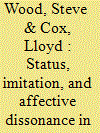| Srl | Item |
| 1 |
ID:
191827


|
|
|
|
|
| Summary/Abstract |
The AUKUS agreement to facilitate Australia's acquisition of nuclear-powered submarines has been described by its critics as a ‘bet' on the U.S. This bet entails serious risks for Australia. These risks include uncertainty around construction of the submarines; uncertainty around the U.S.'s long-term commitment to the region; and uncertainty about the future political trajectory of the U.S. These risks are compounded by the sovereignty-constraining implications of AUKUS. The reliance on U.S. technical expertise, and the demands of military interoperability, will bind Australian defence policy more closely to the U.S. than ever. Hence, AUKUS is a deal that demands close scrutiny. This article contributes to such scrutiny, exploring the risks associated with this bet on the U.S. In particular, it examines the ‘America’ that Australian governments expressly want – a liberal internationalist America with a strong commitment to democracy – and then contrasts this with the America that Australia does not want but may well get: an illiberal America that is increasingly anti-democratic at home and crudely transactional, protectionist and undiplomatic abroad. The obvious problem with this approach, we argue, is that Australia does not get to choose the presidential administration in the U.S. over the next twenty to forty years.
|
|
|
|
|
|
|
|
|
|
|
|
|
|
|
|
| 2 |
ID:
151650


|
|
|
|
|
| Summary/Abstract |
The extrajudicial killing of Osama bin Laden (OBL) on 2 May 2011 was greeted with jubilation in the United States. The dominant interpretation of the event – expressed in US media, by US political elites, and on the streets of US cities – was that justice had been served on the perpetrator of the 9/11 atrocity and thereby a great historical wrong had been righted. This article argues that the ‘justice’ deployed was a proxy for revenge, understood as the infliction of harm on those who had inflicted harm on the avenger. The argument is situated in a broader discussion of the emotional topography on which acts of state revenge are politically premised. The bin Laden case is used to explore some issues raised by the growing literature on emotions in politics and International Relations including, most importantly, how emotions are collectivised and made public.
|
|
|
|
|
|
|
|
|
|
|
|
|
|
|
|
| 3 |
ID:
174669


|
|
|
|
|
| Summary/Abstract |
LLOYD COX and BRENDON O’CONNOR challenge the common realist assumption that emotions are irrelevant for understanding inter-state relations. They examine the notion of special relationships in international politics. They develop a distinctive approach to the collectivization of emotions within and between states and apply this to the U.S.-Australia
special relationship.
|
|
|
|
|
|
|
|
|
|
|
|
|
|
|
|
| 4 |
ID:
182571


|
|
|
|
|
| Summary/Abstract |
This article explores the interplay of status, imitation and affective dissonance in international relations. Some states and nations selectively imitate others to correct perceived status deficits. Over time imitation can diminish ideals of group distinctiveness and independence from models and norm-setters, stimulating a condition we term affective dissonance. This complex of processes underlies some tensions in contemporary world politics. We apply the propositions to case studies of Russia and China whose leaders assert themselves as the principal loci and prescribers of national authenticity.
|
|
|
|
|
|
|
|
|
|
|
|
|
|
|
|